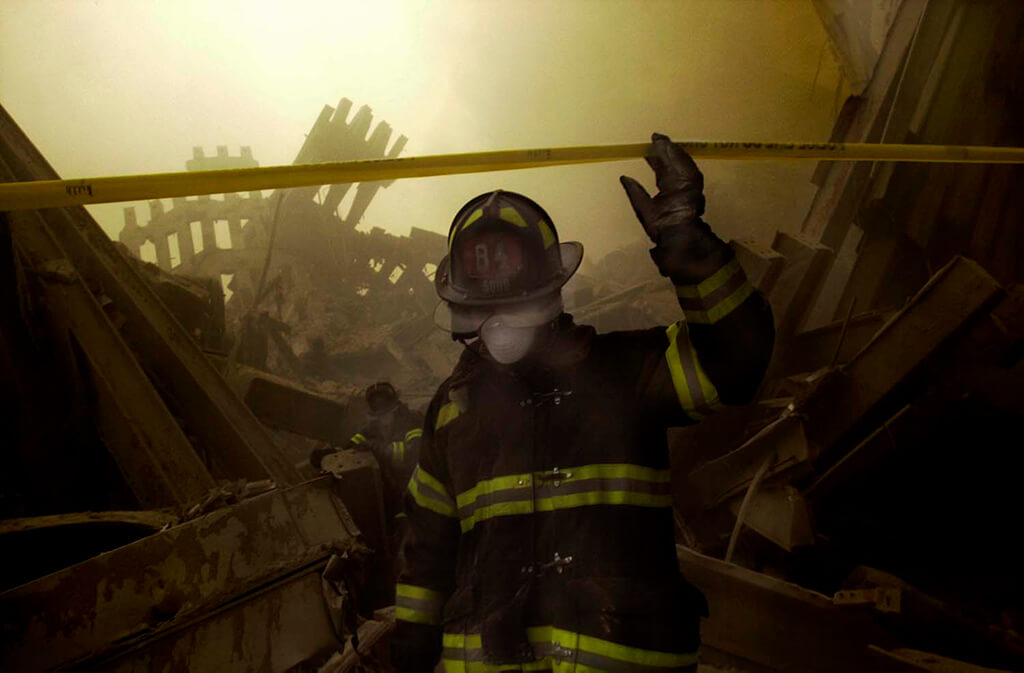Says he asks ‘common sense’ questions that he shouldn’t have to apologize for
It is always great news when a new expert takes on the official narrative of the September 11, 2001, destruction of the World Trade Center.
The most recent example can be seen in an October 15 article in the International Fire & Safety Journal under the title, “Did World Trade Center Building 7 really collapse due to an office fuel load fire?” You can read the article here and the archived version here.
The article’s author, longtime firefighting expert Raul Angulo, was Andy Steele’s guest on the most recent episode of 9/11 Free Fall. A 36-year veteran of the Seattle Fire Department, Angulo has held leadership positions with several firefighting organizations as well as publishing more than 350 articles in major firefighting magazines. He is also the author of the book Engine Company Fireground Operations.
Angulo offers this insight into his reasons for writing the 12,000-word article:
“This article is all about establishing transparency, integrity, trust, and truthfulness. I now view the official narrative with skepticism because it doesn’t make sense and doesn’t match with the video observable evidence. It also does not stand up to the scrutiny conducted by the forensic structural engineers at the UAF.”
As he gets into the details of the evidence, he asks this question:
“Did the World Trade Center Building 7 (WTC 7) really, completely, collapse in freefall, symmetrically into its own footprint – in seven seconds – due to an office fuel load fire? I used to believe that – the official narrative, but now, I can no longer accept that explanation. For many of us, this is still a visceral and emotional subject, but it’s been 23 years since September 11, 2001. A lot of the strong sentiments have died down enough to objectively consider more reasonable, scientific, and physical (physics) explanations.”
Angulo notes that no such building has ever collapsed due to fire, and if it had happened in this case there certainly would have been a push to change fire protection standards for high-rise buildings.
“If the magnitude of this event is considered in isolation, without distractions of its historical context – in other words, had it happened in any other building, in any other city, on any other date – it would be the #1 case study in high-rise firefighting. Our strategy, tactics, and standards would have been reviewed and changed to incorporate the possibility of these types of buildings falling upon us – at freefall acceleration in as short a time as seven seconds – as WTC 7 did.”
The IFSJ article looks at the report on WTC 7 by Leroy Hulsey and the University of Alaska Fairbanks, which came to these two primary conclusions: that all the core columns in the building had to have failed at virtually the same instant and that fire could not have produced this result.
“They’re being nice…and professional, but in other words, they were saying NIST’s theoretical positions are untenable, they’re wrong, and in fact, impossible.”
Angulo explains that numerous firefighters described hearing explosions in Building 7, and many also recount hearing warnings that the building was going to come down hours before it did.
“In fact, there are about 60 FDNY firefighters who reported hearing the warnings that WTC 7 was going to collapse. But where did this warning originate from?”
He adds:
“So who was this person, or people who ascertained, then convinced the fire chiefs to withdraw their firefighters four to five blocks away for their own safety? Could they have known because it was under human control? “I surmise that the firefighters did not come to the conclusion that WTC 7 was going to collapse based on observable conditions; they accepted the warning without question because they were told so by their superiors.”
Angulo concludes that there is a stark contrast between the UAF conclusions and those of NIST and maintains that it is essential that this contradiction be resolved.
“They can’t both be right,” he explains.
“In order to clear up the implications and confusion, we must formally review and compare both reports as a collective body of firefighters, fire prevention inspectors, and building and fire code officials. We must then choose which conclusion seems more logical, and wrestle with the implications they may lead to.”
***
Craig McKee is a writer for Architects & Engineers for 9/11 Truth and the creator of the blogs Truth and Shadows and Thought Crimes and Misdemeanors. He also hosts the Truth and Shadows podcast on YouTube and Rumble.
Check out our engineering panel discussion and interviews from our anniversary 9/11 conference with Jill Stein, Jimmy Dore, Alex Stein, Zach Vorhies, and Daniele Ganser, Madhava Setty, Meryl Nass, Sean Stone and Ian Crossland that have already been posted on our YouTube channel!





